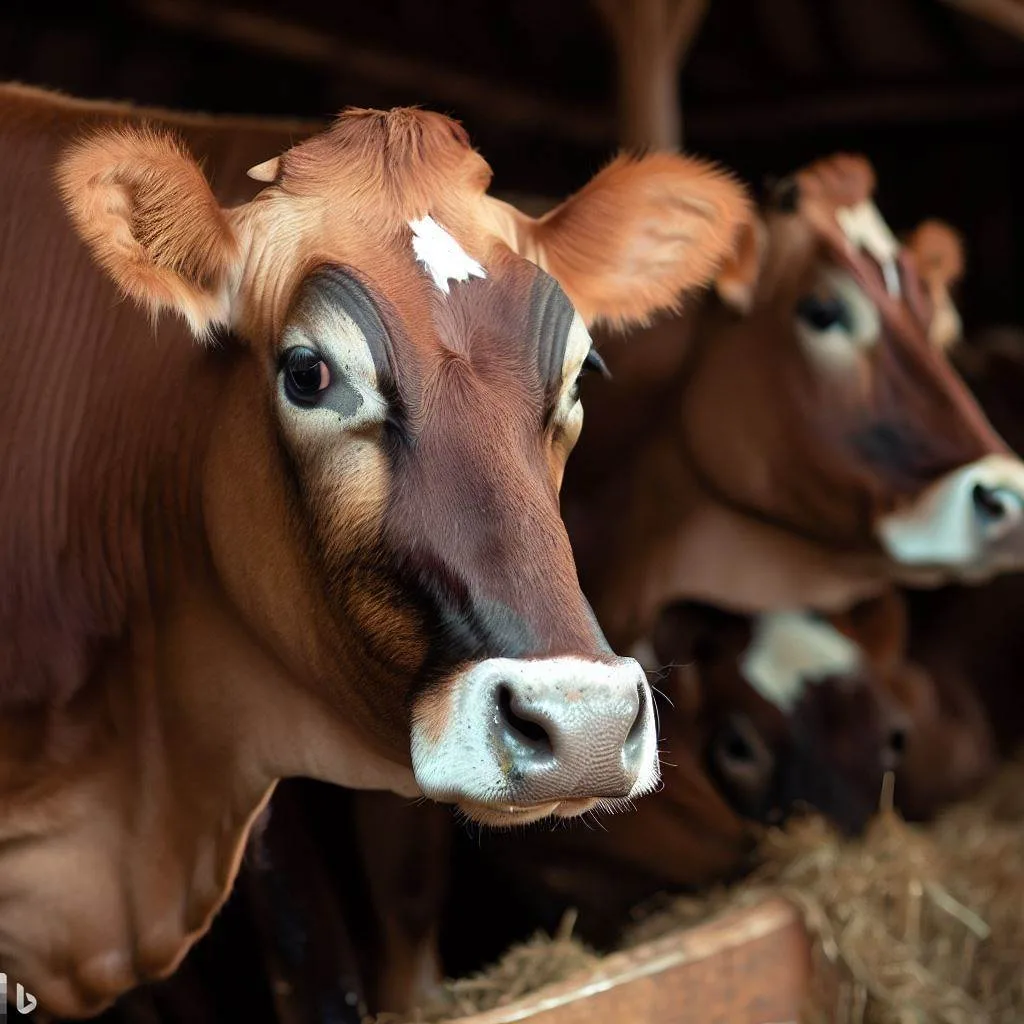Jersey cow farming refers to the rearing of Jersey cows for milk production in India. The Jersey breed is a small breed of dairy cattle that originated from the Isle of Jersey, a small British island in the English Channel. In India, Jersey cows are becoming increasingly popular for their high-quality milk production, efficiency, and adaptability to various climates. Jersey cow farming is a profitable venture in India, especially for small and marginal farmers who can rear a few cows for milk production.
Importance of Jersey Cow Farming in India
Jersey cow farming in India is gaining popularity due to its high milk yield and excellent milk quality. The milk produced by Jersey cows has a higher fat content and protein content than other breeds, making it ideal for producing high-quality dairy products such as cheese, butter, and ghee. Jersey cows are also known for their docile nature and adaptability to various climates, making them an excellent choice for small and marginal farmers in India.
Jersey cow farming in India also plays a vital role in the country’s economy by providing a source of income for farmers and generating employment opportunities in the dairy sector. Additionally, Jersey cow farming promotes self-sufficiency in dairy products and reduces the dependence on imported dairy products, which contributes to the country’s overall economic growth.
Jersey cow farming has become increasingly popular in recent years due to the breed’s high-quality milk production, adaptability to various climates, and efficiency. Selecting the right breed of cow is crucial to ensure the success of the farming enterprise. In this article, we will discuss the characteristics of Jersey cows, the advantages of Jersey cows, and why they are the right breed for dairy farming.
Advantages of Jersey cows:
Jersey cows offer several advantages for dairy farming, including high milk yields, efficient feed conversion, and ease of management. Due to their high-quality milk production, Jersey cows are highly valued by dairy farmers. They produce milk with a higher butterfat content, which is preferred for producing butter and cheese. Jersey cows also have a higher feed conversion efficiency, meaning that they can produce more milk per unit of feed consumed than other breeds. This translates into lower feed costs for farmers. Additionally, Jersey cows are easier to manage due to their smaller size, making them ideal for smaller farms or farms with limited resources.
Jersey cows are a small breed of dairy cattle that require specific housing requirements to ensure their health and productivity. A clean and comfortable living space is essential for Jersey cows as it helps reduce stress and prevent diseases.

Housing Requirements for Jersey Cows
Jersey cows require a spacious and well-ventilated housing facility that protects them from harsh environmental conditions. The following are the housing requirements for Jersey cows:
- Size: The size of the housing facility depends on the number of cows in the herd. It should have enough space to accommodate all cows comfortably. A standard size of 10ft x 10ft per cow is recommended.
- Ventilation: Proper ventilation is crucial to maintain the air quality in the housing facility. It helps to remove moisture, dust, and other harmful gases from the air. The housing facility should have enough openings to ensure adequate ventilation.
- Lighting: The housing facility should have sufficient natural or artificial lighting to maintain a comfortable living environment for the cows. It helps to regulate their body clock and ensure they have enough time to rest.
- Flooring: The flooring of the housing facility should be non-slippery and easy to clean. It should also provide adequate drainage to prevent the accumulation of urine and manure.
- Temperature Control: The housing facility should have proper insulation to maintain a comfortable temperature for the cows. In colder climates, heating may be required to ensure their comfort.
Importance of clean and comfortable living space
A clean and comfortable living space is essential for the health and productivity of Jersey cows. Here are the reasons why:
- Reduced Stress: A comfortable living space reduces the stress levels of Jersey cows, which can lead to better milk production and overall health.
- Disease Prevention: A clean housing facility helps prevent the spread of diseases among the cows. Regular cleaning and disinfection help maintain hygiene in the facility and prevent the buildup of harmful bacteria and viruses.
- Improved Milk Quality: A comfortable living space results in better milk quality as it reduces the risk of contamination by harmful bacteria.
- Longer Lifespan: A comfortable living space can increase the lifespan of Jersey cows as it reduces the risk of injuries and stress-related illnesses.
Requirements for feeding Jersey cows
- Roughage: Jersey cows need to consume a significant amount of roughage every day. The roughage can come from hay, silage, or pasture. The recommended amount of roughage is around 1.5 to 2.5% of their body weight.
- Concentrates: Jersey cows also require concentrates to meet their energy and protein requirements. Concentrates can include grains like corn, barley, or wheat. A balanced concentrate mix is recommended to ensure all nutritional requirements are met.
- Water: Clean and fresh water is essential for Jersey cows. They require around 25 to 50 liters of water per day, depending on their weight and milk production.
- Minerals and vitamins: Jersey cows also need minerals and vitamins in their diet. These can be provided through supplements or by ensuring that the roughage and concentrates contain the necessary nutrients.

Importance of a balanced diet
- Milk production: A balanced diet is essential for maintaining milk production in Jersey cows. If they are not receiving the necessary nutrients, their milk production may decrease.
- Health: A balanced diet is also crucial for maintaining the health of Jersey cows. Nutritional deficiencies can lead to various health issues like lameness, reproductive problems, and mastitis.
- Reproduction: A balanced diet is necessary for successful reproduction in Jersey cows. Nutritional deficiencies can lead to poor fertility and reduced conception rates.
- Longevity: A balanced diet can also contribute to the longevity of Jersey cows. By providing them with all the necessary nutrients, they can live longer and healthier lives.
Milking
Milking is a crucial aspect of Jersey farming as it directly affects the quality and quantity of milk produced. To maintain the quality of the milk produced, proper milking hygiene and sanitation are of utmost importance.
Milking hygiene involves the cleanliness of the cows, the milking equipment, and the environment where the milking takes place. Before milking, the udder should be cleaned and sanitized to prevent contamination. The milking equipment should also be cleaned and sanitized before and after each use to prevent the spread of bacteria and disease. The environment where the milking takes place should also be clean and dry to prevent the growth of bacteria.
The use of proper milking equipment is also essential for efficient milking. The most common milking equipment used for Jersey cows is the milking machine. The machine has a vacuum system that mimics the natural sucking motion of the calf, allowing the milk to be extracted efficiently. The machine also has a pulsating system that ensures that the cow’s udder is not overstimulated, which can lead to discomfort and decreased milk production.
Apart from the milking machine, other essential equipment for milking includes milking buckets, milk strainers, and milk storage tanks. The milking buckets are used to collect the milk, while the milk strainers are used to filter out any impurities. The milk storage tanks are used to store the milk before it is transported for further processing.
Breeding:
The importance of breeding for productivity cannot be overstated. Jersey cows with desirable traits are more likely to produce high-quality milk, which is essential for the success of the dairy farming operation. By selecting the right cows and bulls, farmers can improve their herd’s genetics, leading to increased milk production and better profitability.
There are two main methods of breeding Jersey cows: natural breeding and artificial insemination. Natural breeding involves allowing the bull to mate with the cow naturally. This method is often used in smaller dairy farming operations. However, it can be challenging to control breeding in larger herds, and artificial insemination is often preferred.
Artificial insemination involves the use of a skilled technician who injects semen from a carefully selected bull into the cow’s reproductive tract. The semen is collected from the bull and stored in liquid nitrogen tanks for later use. This method allows farmers to select the best bulls and cows from all over the world, improving the genetic diversity of their herd.
Breeding is a crucial aspect of Jersey cow farming, and it must be done carefully to ensure the production of high-quality milk. The importance of breeding for productivity cannot be overstated, and farmers must use the right breeding methods to improve their herd’s genetics. By selecting the right cows and bulls, farmers can improve milk production and profitability. The use of artificial insemination is an excellent method for improving the genetic diversity of the herd, leading to better milk production and a more profitable dairy farming operation

Health care
Health care is a crucial aspect of Jersey cow farming, and it is important to ensure that the cows are healthy and productive. Regular health checks and vaccination schedules play a significant role in maintaining the health of Jersey cows. Farmers should work closely with a veterinarian to develop a comprehensive health care plan that includes regular check-ups and vaccinations.
Jersey cows are susceptible to several diseases, and it is important to take measures to prevent them. Farmers should practice good hygiene, including regular cleaning and disinfecting of the housing and milking areas. Cows should also be fed a balanced diet and given access to clean water to prevent illness.
Preventing diseases in Jersey cows also involves providing them with adequate nutrition. Farmers should develop a feed chart that includes a balanced diet of high-quality forages, grains, and supplements. The feed should be adjusted based on the cow’s age, weight, and milk production to ensure that they are getting the necessary nutrients.
In addition to regular health checks and proper nutrition, vaccination schedules are also essential in preventing diseases in Jersey cows. Farmers should work with their veterinarians to develop a vaccination plan that is tailored to the specific needs of their herd. Common vaccinations for Jersey cows include those for bovine viral diarrhea, leptospirosis, and infectious bovine rhinotracheitis.
You can explore our Jersey Cow farming course through the following links:
Jersey Cow farming in Tamil:
https://ffreedom.com/tamil/farming-courses/earn-up-to-3-lakh-per-month-with-jersey-dairy-farming
Jersey cow farming in Telugu:
Jersey cow farming in Kannda:



